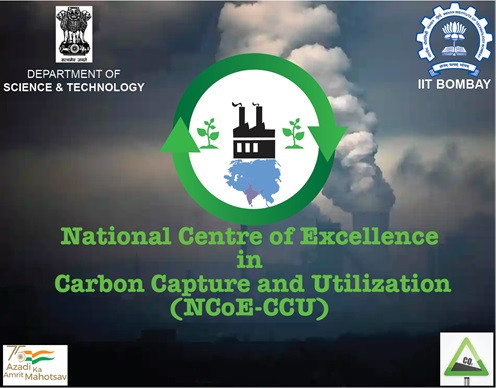India to set up NCoE for CCU tech at IIT-Bombay and JNCASR, supported by DST
Ministry of Science & Technology, India has announced that two National Centres of Excellence in Carbon Capture and Utilization (CCU) are being established. The two Centres, namely the National Centre of Excellence in Carbon Capture and Utilization (NCoE-CCU) at Indian Institute of Technology (IIT) Bombay, Mumbai, and the National Centre in Carbon Capture and Utilization (NCCCU) at Jawaharlal Nehru Centre for Advanced Scientific Research (JNCASR), Bengaluru are being set up with support from the Department of Science & Technology, Govt. of India.
These CoEs will facilitate capturing & mapping of current R&D and innovation activities in the domain and develop networks of researchers, industries, and stakeholders with coordination and synergy between partnering groups and organizations. The Centres will act as multi-disciplinary, long-term research, design development, collaborative, and capacity-building hubs for state-of-the-art research and application-oriented initiatives in the field of CCU.
The NCoE-CCU at IIT Bombay will define milestones and spearhead science and technology initiatives for industry-oriented CCU innovation in India, alongside developing novel methodologies for improving the technology readiness levels in CCU. It will accelerate the R&D efforts in methods of carbon capture and utilization. The centre will also work on the conversion of captured carbon dioxide to chemicals, CO2 transport, compression, and utilization, as well as on enhanced hydrocarbon recovery as co-benefit pathways. The NCoE-CCU will also develop and demonstrate efficient CO2 capture from representative flue gas from the effluents of a power plant and biogas plant.
The NCCCU at JNCASR, Bengaluru, will aim to develop and demonstrate carbon capture and conversion by developing relevant materials and methodologies. These processes will be scaled up to pilot scale mode to produce hydrocarbons, olefines, and other value-added chemicals and fuels. It will also work on reaching the technology readiness level on par with the commercial requirement at the industry level. The centre will promote the CCU research, provide training and consultancy and translate its research excellence into solutions with global economic and social impact.
The Centres will help bring together the country's collective strength and assist in the development of an appropriate and feasible R&D and innovation roadmap. The Centres will also keep watch on international trends and suggest possible collaborative endeavours.
Under the strict climatic regime, it is vital to identify and adopt the right balance of portfolio of emission curtailment technologies. Carbon Capture and Utilization (CCU) is among such key pathways to reduce emissions while continuing to develop sustainably at an unprecedented pace. CCU aligns with five of the seventeen sustainable development goals (SDGs), namely, climate action; clean energy, industry, innovation, and infrastructure; responsible consumption and production; and partnerships to achieve the goals.






















